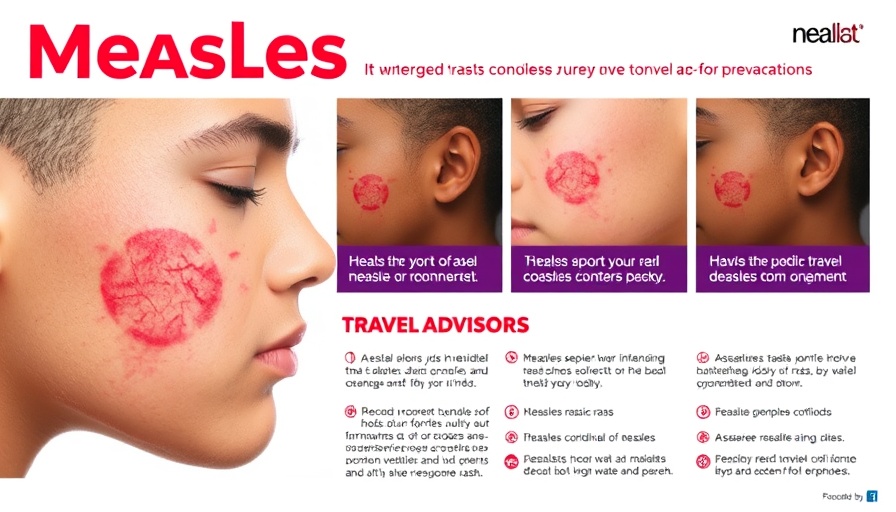
Resurgence of Measles in Texas: A Public Health Concern
In recent years, Texas has witnessed an alarming resurgence of measles, with a staggering increase of over 30% in reported cases in 2023, particularly among school-aged children. Once nearly eradicated, this highly contagious disease has reemerged, and experts point to declining vaccination rates as a significant contributing factor. This situation raises critical questions about community health, the safety of vaccines, and parental decisions about their children's immunization.
Understanding Measles: Key Symptoms and How It Spreads
Measles is not just a mild childhood illness; it is a serious viral infection that can lead to severe complications, especially in unvaccinated individuals. Symptoms usually manifest as a high fever, cough, runny nose, and eventually, a tell-tale red rash that appears a few days into the illness. The virus is primarily transmitted through respiratory droplets, making it highly contagious. It can linger in the air for hours, posing a threat to unvaccinated children who may not yet be showing symptoms.
Vaccination: A Plea for Community Responsibility
The importance of vaccinations cannot be overstated. They are not just about protecting your child; they play a vital role in maintaining herd immunity, which protects those who are unable to be vaccinated, such as infants and individuals with certain medical conditions. Vaccination has been proven to be safe and effective, drastically reducing the risk of measles and other diseases. Public health campaigns must continue to work diligently to counteract the myths surrounding vaccinations that discourage parents from immunizing their children.
Statistics on Measles Cases: A Call to Action
With the rise in measles cases, statistics reveal troubling trends. In 2023 alone, Texas reported an increase of over 30% in measles cases compared to 2022, sparking concerns about declining immunization rates among school-aged children. It is essential for parents to stay informed and understand the critical need to vaccinate their children for the health of both individual families and the broader community. Parents wield significant power—by choosing to vaccinate, they can help halt the spread of this preventable disease.
Multiple Perspectives: The Hesitancy Behind Vaccination
Vaccine hesitancy remains a complex issue, influenced by a variety of factors including widespread misinformation, personal beliefs, and historical distrust in the medical system. Some parents may fear potential side effects or have been misled by anecdotal reports linking vaccinations to other health issues. Understanding these fears is crucial in addressing the root cause of hesitancy and fostering informed decisions about vaccinations.
Looking to the Future: Ensuring Healthier Generations
As Texas continues to grapple with rising measles cases, there is a pressing need for collective action to protect future generations. Families, schools, and health organizations must collaborate to increase awareness, facilitate better access to vaccines, and encourage open dialogues about the benefits of immunization. Building trust among parents and communities can play a significant role in reversing the current trends in vaccination rates and protecting our children from outbreaks.
Ultimately, protecting our children from measles is a shared responsibility. By understanding the challenges and taking proactive steps, we can work together to create a healthier tomorrow for everyone. Stay informed, stay engaged, and ensure your child is vaccinated.
 Add Row
Add Row  Add
Add 




 Add Row
Add Row  Add
Add 

Write A Comment